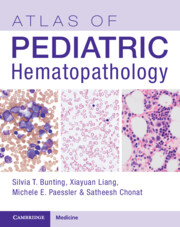Book contents
- Atlas of Pediatric Hematopathology
- Atlas of Pediatric Hematopathology
- Copyright page
- Contents
- Contributors
- Section I Peripheral Blood
- Section II Normal and Non-neoplastic Hematolymphoid Diseases
- Section III Mature Lymphoid Neoplasm
- Section IV Precursor Hematopoietic Neoplasms and Related Neoplasms
- Chapter 13 Precursor Lymphoblastic Leukemia/Lymphoma
- Chapter 14 Blastic Plasmacytoid Dendritic Cell Neoplasm
- Chapter 15 Acute Myeloid Leukemia and Related Precursor Neoplasms
- Chapter 16 Myeloproliferative Neoplasms
- Chapter 17 Myelodysplastic/Myeloproliferative Neoplasms
- Chapter 18 Childhood Myelodysplastic Syndrome
- Chapter 19 Germline Predisposition to Myeloid Neoplasia
- Chapter 20 Germline Predisposition to Lymphoid Neoplasm
- Chapter 21 Mastocytosis and Myeloid Lymphoid Neoplasms with Eosinophilia
- Section V Histiocytic Neoplasm and Miscellaneous Bone Marrow Diseases
- Index
- References
Chapter 20 - Germline Predisposition to Lymphoid Neoplasm
from Section IV - Precursor Hematopoietic Neoplasms and Related Neoplasms
Published online by Cambridge University Press: 25 November 2023
- Atlas of Pediatric Hematopathology
- Atlas of Pediatric Hematopathology
- Copyright page
- Contents
- Contributors
- Section I Peripheral Blood
- Section II Normal and Non-neoplastic Hematolymphoid Diseases
- Section III Mature Lymphoid Neoplasm
- Section IV Precursor Hematopoietic Neoplasms and Related Neoplasms
- Chapter 13 Precursor Lymphoblastic Leukemia/Lymphoma
- Chapter 14 Blastic Plasmacytoid Dendritic Cell Neoplasm
- Chapter 15 Acute Myeloid Leukemia and Related Precursor Neoplasms
- Chapter 16 Myeloproliferative Neoplasms
- Chapter 17 Myelodysplastic/Myeloproliferative Neoplasms
- Chapter 18 Childhood Myelodysplastic Syndrome
- Chapter 19 Germline Predisposition to Myeloid Neoplasia
- Chapter 20 Germline Predisposition to Lymphoid Neoplasm
- Chapter 21 Mastocytosis and Myeloid Lymphoid Neoplasms with Eosinophilia
- Section V Histiocytic Neoplasm and Miscellaneous Bone Marrow Diseases
- Index
- References
Summary
While the number of germline mutations known to confer predisposition to myeloid malignancy has gained broad recognition, there is also increasing awareness of genes predisposing to lymphoid neoplasia. This chapter addresses select genes associated with germline predisposition to lymphoid neoplasms. Genes covered in this chapter are associated with familial B-lymphoblastic leukemia (B-ALL) [1], general cancer predisposition syndromes, and primary immunodeficiency syndromes (PID) (Table 20.1). Individuals with PID are predisposed to lymphoproliferations as a result of complex interactions between germline genetic defects, viral oncogenes, impaired immunosurveillance, and chronic antigen stimulation [2]. Of note, many of the B-cell lymphoproliferations that occur in the setting of a PID show frequent Epstein-Barr virus (EBV) positivity and tendency to involve extranodal sites.
- Type
- Chapter
- Information
- Atlas of Pediatric Hematopathology , pp. 230 - 246Publisher: Cambridge University PressPrint publication year: 2023

